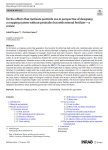Pergner I., Lippert C. (2023). On the effects that motivate pesticide use in perspective of designing a cropping system without pesticides but with mineral fertilizer - a review. Agronomy for Sustainable Development, 01/04/2023, vol. 43, n. 2, p. 1-22.
https://doi.org/10.1007/s13593-023-00877-w
https://doi.org/10.1007/s13593-023-00877-w
| Titre : | On the effects that motivate pesticide use in perspective of designing a cropping system without pesticides but with mineral fertilizer - a review (2023) |
| Auteurs : | I. Pergner ; C. Lippert |
| Type de document : | Article |
| Dans : | Agronomy for Sustainable Development (vol. 43, n. 2, April 2023) |
| Article en page(s) : | p. 1-22 |
| Langues : | Anglais |
| Langues du résumé : | Anglais |
| Catégories : |
Catégories principales 06 - AGRICULTURE. FORÊTS. PÊCHES ; 6.6 - Technique Agricole (sols, engrais, mécanisation)Thésaurus IAMM SYSTEME DE CULTURE ; ENGRAIS ; ENGRAIS MINERAL ; RENDEMENT DES CULTURES ; SECURITE ALIMENTAIRE |
| Résumé : | In the future, a cropping system that guarantees food security by delivering high yields and, simultaneously, protects our environment is desperately needed. This can be achieved through a cropping system that waives chemical synthetic plant protection products, which endanger, for example, biodiversity and water resources. However, such a system, referred to here as the mineral-ecological cropping system (MECS), should still allow for the usage of mineral fertilizers to ensure high yields. It can be thought of as a compromise between the current conventional and organic cropping systems. This article presents a comprehensive literature review on the economic, social, and environmental effects of pesticides and the resulting reasons farmers have to use (or not use) them. Hereby, regarding future pesticide reduction, we identify hindrances and potential benefits that could be mobilized to design the MECS. The major points are the following: in a MECS, (1) it is expected that yields and temporal stability of yields will be higher than in organic farming, but lower than in conventional farming; (2) profitability might suffer due to high input costs and energy consumption; (3) it is expected that soil fertility and biodiversity protection will increase along with the promotion of alternative disease and pest control measures; (4) crop rotations will be wider and more diverse than in conventional farming; (5) mineral fertilizer cannot be optimally used by the crops unless a balanced supply of nitrogen is achieved. Farmers who want to switch to MECS should be compensated as they are likely to experience higher costs and lower yield and yield stability. The lessons learned from this review will help to progress toward an innovative and sustainable cropping system. Further research should focus on rational farmers' adaptation possibilities when abandoning pesticides while still using mineral fertilizers. |
| Cote : | En ligne |
| URL / DOI : | https://doi.org/10.1007/s13593-023-00877-w |







